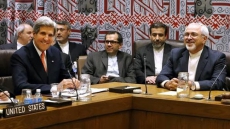The lessons learnt from China-India land border dispute management can help settle the maritime dispute between China and Japan and the disputes in the South China Sea, a leading Chinese daily said Tuesday.
“On the eve of (Chinese) President Xi Jinping’s visit to India in September 2014, Indian Prime Minister Narendra Modi coined the term 'Inch towards Miles' that underpins his hopes for the future of the (India-China) relationship,” an opinion piece in the China Daily stated.
“The lessons learnt from China-Indian land border can be conducive to settling the maritime dispute between China and Japan and the disputes in the South China Sea,” it said.
Stating that the Indian media was obsessed with the Sino-Indian border issue, it said that allegations like “Chinese troops crossing the border” have not only been denied by Chinese spokespersons, but in many times brushed aside by senior Indian officials as well.
“The reason is simple: The border that led to a war between China and India in 1962 has never been demarcated,” the article stated.
“What lies instead is the Line of Actual Control, a line not verified in terms of alignment. And without a clear idea of how the alignment really goes, patrol troops could end up entering an area perceived by the other side to be its own 'territory'. And tensions have flared up sometimes.”
According to the article's author, Zhou Bo, a fellow with the Center of China-American Defense Relations in the Academy of Military Science, there are two ways of looking at the Sino-Indian border issue.
“One could easily argue that negotiations at different levels have so far failed to yield expected progress and haven’t prevented, for example, quite a few eyeball-to-eyeball standoffs since the 1980s. Nevertheless, there has been no conflict since 1962. For over half a century, not a single bullet has been fired across the border,” the article stated.
“The success in terms of crisis management comes first from an agreement between the two governments that border issue is not the be all and end all of bilateral relationship. At every summit, border issue is discussed, but to the extent that it will not overshadow cooperation in other fields.”
According to the article, a “territorial dispute is a political issue that needs to be discussed at the top political level”.
“Sino-Indian summits always include the border issue. The Japanese government, however, holds that there exists no dispute over Diaoyu Islands, but says it is willing to talk. But how can people fix a problem if they don’t even agree that there is a problem? This attitude of 'we have no problem, but let’s talk' is like putting the cart before horse," it said.
Second, it said, political guidelines needed confidence building measures to back up and referred to the agreement signed by China and India in 1993 to maintain peace and tranquility along the Line of Actual Control, which is the basic guideline for the border issue.
“This guideline was followed by military confidence measures in 1996 and then the border defence cooperation agreement in 2013. As a result, confidence has grown and measures have started to take effect.”
It mentioned that China and Japan recently agreed to restart negotiations on a maritime liaison system, which included steps to avoid incidents between Chinese and Japanese military ships and aircraft.
“Similarly, China and Asean (Association of South Easst Asian nations) have agreed to start negotiations on a code of conduct in the South China Sea. These are good news, but compared with the China-India confidence building measures, these efforts are still at a very early stage and should be followed through seriously.”
The article stressed that addressing territorial disputes required patience and perseverance.
Though China has resolved 90 percent of its land border disputes with neighbouring countries, “the Sino-Indian border is a thorny issue complicated by colonial history and geographical complexities”.
Stating that territorial disputes were not rare in the world, it said in Asia, a European Union-type “pooling sovereignty” was next to impossible.
“However, the Chinese and the Indian governments have demonstrated, in a convincing way, how countries with territorial disputes can safeguard their sovereignty without resorting to war,” it concluded.





